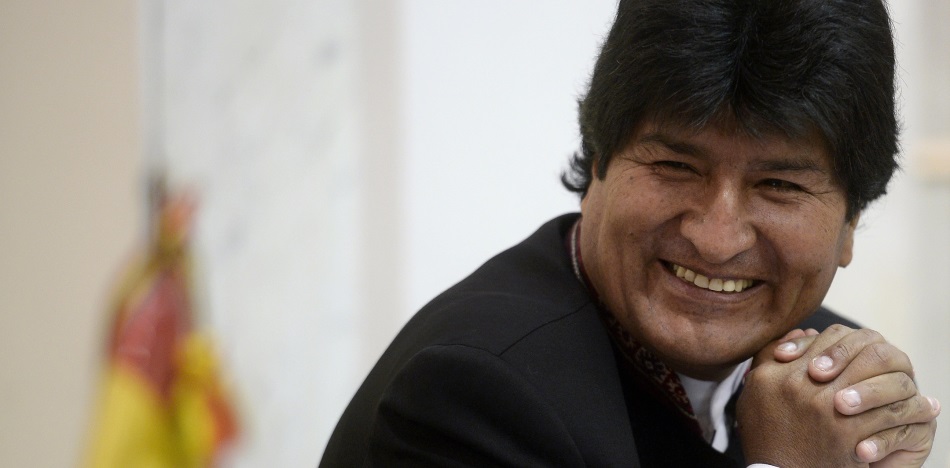
By Camilo Gómez
The left‘s romance with Bolivia’s President Evo Morales is not as strong as it was in the past, especially after the backlash over trying to build a road inside the ecological reserve TIPNIS.
They even accuse Morales of being a neoliberal, but the label conservative socialist is more accurate. The term may sound strange, but there is no other way to describe a pro-life, anti-imperialist, fan of Che Guevara who also manages the economy in the style of Margaret Thatcher, according to the Financial Times.
- Read More: Bolivia’s Mining Industry Puts President Morales Between a Rock and a Hard Place
- Read More: Bolivia President Evo Morales Accuses OAS of Supporting “Coup” in Venezuela
Morales is an enigmatic politician who came from a modest upbringing as a coca leaf-farming peasant, to become an icon of the contemporary left.
Even though Evo Morales is a self-described socialist, and (in theory) one of the most left-wing of Latin America’s Bolivarian wave, it was a shock when the Bolivian president embraced fiscal discipline.
While the Morales government nationalized several oil and gas companies, they simultaneously developed a good enough relationship with the private sector. Overall, the government has been surprisingly fiscally conservative.
Institutions like the IMF and World Bank, of which Morales is a strong critic, have praised his austerity. On social issues, Morales is surprisingly conservative. On abortion rights, the Bolivian government is moderate and only allows abortions for rape or incest, and when the life of a woman is in danger. On gay rights, the government opposes both gay marriage and civil unions, plus homosexuals are barred from serving in the army.
As the first indigenous president in indigenous-majority Bolivia, Morales’ victory was historic. Since colonial times, the indigenous population suffered marginalization at the hands of Spanish descendants and mestizos. The indigenous people of the Andean region, mostly Aymara, but also Quechua, and other smaller indigenous ethnic groups, felt neglected until a president who looked like them took power.
The indigenous majority was a victim of colonialism and racism, and so, when Morales came along, the indigenous saw in him a leader who would finally look out for their interests. Morales doesn’t only talk indigenous rights, though, as political posturing –– he really cares about respecting indigenous people’s dignity. He wants to recover indigenous wisdom, including their philosophy known as buen vivir, which focuses on the harmony between community and nature. Morales was able to implement some social programs that largely benefit indigenous people, like Bolsa Familia to fight poverty and bilingual literacy programs to improve education.
This is not to say everything is perfect in Bolivia. For example, last year the police used water cannons on disabled activists in wheelchairs who we were protesting in favor of an increase in their monthly welfare benefit. The government responded that it wasn’t in the budget, causing outrage, but thereby showing commitment to fiscal conservatism. Corruption is also a big problem despite the attempts of the government to fight it. Other things, like personal scandals, made Morales lose the referendum for a fourth term bid.
Morales knows his country. He knows people in rural Bolivia don’t have the same concerns as a bunch of millennial Marxists in Brooklyn. The Bolivian left is dominated by a union coalition of both mining and farm workers, two groups known for their machista attitudes. It’s, therefore, clear that Morales’ policies on social issues are representative of the country context and the people he leads.
Even if Morales rails against neoliberalism, he is not moving the country toward a Marxist revolution. The fact is that he understands the role of the market in improving people’s lives, especially indigenous groups, since they are the most involved in informal economic activities. On drugs, he has been focused on controlling the production of cocaleros (coca growers) rather than outlawing coca crops (like other countries in the region have done).
In keeping with these efforts, he has expelled the DEA, and he talks about the importance of coca leaf consumption as part of Bolivian tradition. The contrast with other countries in the region, especially those that did not follow the Bolivarian wave, like Colombia and Peru, is that there is a strong ideological component to opposing US drug policies. Morales characterizes the US as imperialist and unlike many social democrats in Europe –– and even their neighbor, Chile –– he defines himself as anti-imperialist.
In general, Morales has a better relationship with both business leaders and social movements than other governments in the region could dream of, proving he’s not as far left as many might think.
Camilo Gómez is a Young Voices Advocate, blogger at The Mitrailleuse and host of the Late Night Anarchy podcast. He can be found in Twitter at @camilomgn.
 Versión Español
Versión Español












